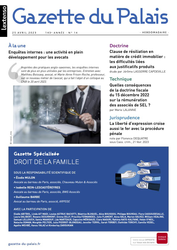April 25, 2023
Interviews

♾️follow Marie-Anne Frison-Roche on LinkedIn
♾️subscribe to the Newsletter MAFR Regulation, Compliance, Law
____
► Full Reference: M.-A. Frison-Roche & M. Boissavy, "Enquêtes internes : une activité en plein développement pour les avocats" ("Internal investigations: a growing business for attorneys"), interview with Miren Lartigue, Gazette du Palais, 25 April 2023.
____
💬read the interview (in French)
____
► Presentation of the interview by the journal (in French): "Inspirées des Anglo-saxons et boostées par la loi Sapin II du 9 décembre 2016, les enquêtes internes sont de plus en plus utilisées par les entreprises françaises pour vérifier la réalité de pratiques douteuses en leur sein, découvertes ou alléguées. Parce qu’il s’agit d’un nouveau champ d’activité pour les avocats, le Conseil national des barreaux (CNB) y a consacré une journée lors de son colloque organisé les 20 et 21 avril 2023 sur le thème « Avocat et droits de la défense dans les enquêtes internes et la justice négociée », qui a réuni 750 participants sur deux jours. Matthieu Boissavy et Marie-Anne Frison-Roche, qui ont participé à l’organisation de cet évènement, nous expliquent les contours de ce nouveau métier."
____
► Questions asked (in French):
- Quels sont la place et le rôle de l’avocat dans les enquêtes internes et pourquoi le CNB a-t-il souhaité organiser une journée consacrée à ce sujet ?
- Quel est leur rôle dans la réception des alertes ?
- Et dans l’enquête interne proprement dite ?
- Quelle est la complémentarité de l’avocat avec le juriste interne ?
- Quels sont outils utilisés pour le calcul des préjudices, la collecte et le traitement des données ?
- Comment s’applique la déontologie de l’avocat ?
- Et qu’en est-il des droits de la défense ?
- Quelle est l’étendue du secret professionnel de l’avocat ?
________
April 6, 2023
Interviews

♾️follow Marie-Anne Frison-Roche on LinkedIn
♾️subscribe to the Newsletter MAFR Regulation, Compliance, Law
____
► Full Reference: M.-A. Frison-Roche & M. Boissavy, "Avocat et droits de la défense dans les enquêtes internes et la justice négociée" ("Attorneys and rights of the defence in internal investigations and negociated justice"), interview with Marina Brillié-Champaux, Dalloz Actu Étudiant, 6 April 2023.
____
💬read the interview (in French)
____
► Presentation of the interview by the journal (in French): "Futurs avocats, c’est à vous que s’adresse cette interview de Marie-Anne Frison-Roche, agrégée des Facultés de Droit, directrice du Journal of Regulation & Compliance (JoRC) et de Matthieu Boissavy, avocat aux barreaux de Paris et de New York, médiateur, membre du Conseil National des Barreaux, vice-président de la commission Libertés et droits de l’Homme. Les 20 et 21 avril 2023 le Conseil national des barreaux, sous l’impulsion de ses commissions Libertés et droits de l’Homme et Droit et Entreprise, organise un colloque sur le thème « Avocat et droits de la défense dans les enquêtes internes et la justice négociée ». Si vous êtes déjà dans la profession, il se peut que leurs réponses vous intéressent pour le respect du droit à la justice !"
____
► Questions asked (in French):
- En quoi consistent les enquêtes internes ?
- Qu’appelle-t-on la justice négociée ?
- Qu’attendez-vous de ce colloque ?
Le questionnaire de Désiré Dalloz
- Quel est votre meilleur souvenir d’étudiant ?
- Quels sont votre héros et votre héroïne de fiction préférés ?
- Quel est votre droit de l’Homme préféré ?
________
April 3, 2023
Interviews

♾️follow Marie-Anne Frison-Roche on LinkedIn
♾️subscribe to the Newsletter MAFR Regulation, Compliance, Law
____
► Full Reference: M.-A. Frison-Roche & M. Boissavy, "Colloque : « Avocat et droits de la défense dans les enquêtes internes et la justice négociée »" ("Symposium: "Lawyers and rights of the defence in internal investigations""), interview with Olivia Dufour, Actu-Juridique, 3rd April 2023.
____
💬read the interview (in French)
____
► Presentation of the interview by the journal (in French): "Le Conseil national des barreaux (CNB) organise les 20 et 21 avril prochains un colloque intitulé « Avocat et droits de la défense dans les enquêtes internes et la justice négociée ». Matthieu Boissavy, avocat aux barreaux de Paris et de New York, médiateur et vice-président de la commission Libertés et droits de l’Homme du Conseil national des barreaux et Marie-Anne Frison-Roche, professeure de droit, directrice du Journal of Regulation and Compliance nous expliquent les enjeux de ces nouvelles pratiques judiciaires qui bousculent le rôle traditionnel des acteurs de la justice, qu’il s’agisse des avocats ou des magistrats."
____
► Questions asked (in French):
- Le CNB organise les 20 et 21 avril prochains un colloque sur le thème : Avocats et droits de la défense dans les enquêtes internes et la justice négociée. Pourquoi ce choix ?
- La compliance n’est-elle pas en train de bouleverser le métier d’avocat ?
- Comment cela se traduit-il en pratique ?
- Quelles sont les implications déontologiques, ne faut-il pas inventer de nouvelles règles ?
- Qu’est-ce que la CJIP a changé dans le métier d’avocat ?
- Quels sont les nouveaux risques pour l’avocat ?
- Cela modifie-t-il les relations entre avocats, parquet et juges du siège ?
________
March 30, 2023
Thesaurus : 05.1. CEDH
► Full Reference: ECHR, 5th sect., 30 March 2023, François Ruffin vs France and Association Fakir vs France, req. n° 29854/22 and 29863/22.
____
🏛️read the decision (in French)
________
March 30, 2023
Thesaurus : Doctrine
► Référence complète : J. Gallois, "Approche comparative des caractéristiques principales de la convention judiciaire d'intérêt public. À propos des dernières CJIP rendues en application de l'article 41-1-2 du code de procédure pénale en 2022", AJ Pénal, mars 2023, pp.127-131
____
► Résumé de l'article (fait par l'auteure) : "La fin de l'année 2022 a été assurément placée sous le signe de la convention judiciaire d'intérêt public (CJIP). En effet, pas moins de trois accords ont été conclus en moins de trois mois par le parquet national financier (PNF) et plusieurs enseignements peuvent en être tirés.".
____
🦉Cet article est accessible en texte intégral pour les personnes inscrites aux enseignements de la Professeure Marie-Anne Frison-Roche
________
Updated: Feb. 2, 2023 (Initial publication: June 23, 2021)
Thesaurus : Doctrine

► Full Reference: J.-M. Coulon, "Le droit de la compliance dans le secteur d'activité de la construction et les contradictions, impossibilités et impasses auxquelles les entreprises sont confrontées" ("Compliance Law in the construction sector and the contradictions, impossibilities and impasses facing companies"), in M.-A. Frison-Roche (ed.), La juridictionnalisation de la Compliance, coll. "Régulations & Compliance", Journal of Regulation & Compliance (JoRC) and Dalloz, 2023, p. 133-140.
____
📕read a general presentation of the book, La juridictionnalisation de la Compliance, in which this article is published
____
► The summary below describes an article following the colloquium L'entreprise instituée Juge et Procureur d'elle-même par le Droit de la Compliance (The Entreprise instituted Judge and Prosecutor of itself by Compliance Law) , co-organized by the Journal of Regulation & Compliance (JoRC) and the Faculté de Droit Lyon 3. This manifestation was designed under the scientific direction of Marie-Anne Frison-Roche and Jean-Christophe Roda and took place in Lyon on June 23, 2021. During this colloquium, the intervention was shared with Christophe Lapp, who is also a contributor in the book (see the summary of the Jean-Marc Coulon's Article).
In the book, the article will be published in Title I, devoted to: L'entreprise instituée Juge et Procureur d'elle-même par le Droit de la Compliance (The Entreprise instituted Judge and Prosecutor of itself by Compliance Law ).
____
► Summary of the article (done by the author): The construction industry is not a regulated sector. Its market is made up of a superposition of territorial strata which are all relevant markets, to which corresponds a specific microcosm of companies. Finally, the temporary association between companies for the purposes of carrying out a project or a work is consubstantial with this sector.
The penetration of Compliance in this sector is inevitably very heterogeneous and results from both exogenous factors (other partners within temporary associations, influence of economic operators from other sectors of activity, capital providers and lenders, incitations from professional organizations ) the endogenous (submission to a Financial Regulatory Authority because the company is listed ; application of the laws on duty of vigilance, and French Law called "Sapin 2"). For example, subject to all these factors combined, the Bouygues group is particularly sensitive to compliance.
Not only internal "legislator", the Bouygues group finds itself in turn "prosecutor and judge" both of itself and of others. Indeed, leading an investigation, filing a complaint, triggering an ethics alert, making use of the leniency program, this group is, however, no other than a sort of assistant for the Prosecutor. In addition, scrutinizing its stakeholders, sanctioning its employees, resorting to a Convention Judiciaire d'intérêt public (judicial agreement in the public interest) or negotiating its sanction within the framework of a procedure instituted by a multilateral bank, it fulfills the function of a judge. Legislator, prosecutor, judge, the Bouygues group is faced with a paradox, in a way encouraged to exercise “sovereignty”, yet it does not benefit from the attributes attached to it or from the unwavering support of the competent Public Authorities.
________
Feb. 2, 2023
Thesaurus : Doctrine

► Full Reference: A. Bavitot, "Le façonnage de l'entreprise par les accords de justice pénale négociée" ("Shaping the company through negotiated Criminal Justice Agreements"), in M.-A. Frison-Roche (ed.), La juridictionnalisation de la Compliance, coll. "Régulations & Compliance", Journal of Regulation & Compliance (JoRC) and Dalloz, 2023, p. 187-198.
____
📕read a general presentation of the book, La juridictionnalisation de la Compliance, in which this article is published
____
► Summary of the article (done by the author): Negotiated justice is "the situation in which the criminal conflict is the object of a trade in the etymological sense of the term negotio, i.e. a debate between the parties to reach an agreement".
Thus, the French legislator has succumbed to globalized mimicry by creating the Convention judiciaire d'intérêt public (Public Interest Judicial Agreement), first in matters of probity and then in environmental matters. What is the nature of this deal of justice? Validated by a judge's order, it does not entail any declaration of guilt, has neither the nature nor the effects of a judgment of conviction and is not registered in the judicial record. Possible at the investigation stage as well as at the pre-trial stage, the Public Interest Judicial Agreement is original in that it makes it possible to avoid either the prosecutor's proceedings or the judge's wrath.
A detailed study of the agreements signed shows that in order to negotiate in the best possible way, the company can and must shape itself. The company will shape the facts of its agreement, shape its charge and, finally, shape its sentence. The article offers a concrete analysis of these three dimensions of corporate shaping to better approach understanding the legal nature of negotiated criminal justice agreements.
________